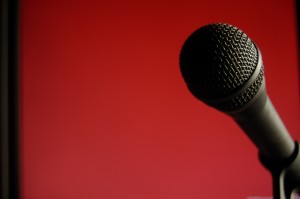Always Use the Microphone

– Just making a quick announcement? Use the microphone.
– Just introducing another speaker? Use the microphone.
– Confident you have a loud voice? Use the microphone.
– Think it’s inconvenient? Use the microphone.
People who are introducing, people who are speaking, people who are transitioning, people who are just making announcements… everyone who is speaking to a group in a professional setting should use a microphone if it is available.
Why? Consider the following.
Reasons You Should Be Using That Microphone
Whether you’re a planner or a speaker, you bear responsibility for communicating your message as effectively as possible. An inability to hear easily, without strain or distortion, is an unnecessary hurdle.
Many people think their voices are loud and use that as a reason not to use a microphone. A loud voice, though, seems louder to the speaker than it does to the audience. Often, the person who claims “I have a loud voice and don’t need a microphone” is simply making an excuse to cover their fear of using a microphone or of hearing their voice amplified.
Good diction and projection are great, but not everyone’s voice has the same volume or timbre. If most people are using the microphone and one person insists on not using it, the drastic change in audio quality is jarring to the audience.
Microphones grant a perceived authority to whomever is using one. The nature of a group is to listen to what is being said on the sound system. This makes a big difference in the dynamics of a meeting, when you may have interruptions or a group discussion that needs to be reined in.
Unless you are a trained singer, you are likely to strain your voice when trying to sustain the increased volume you need to be heard clearly by even a small group. Most people do not like the feeling of being shouted at or “projected to.” The microphone allows the speaker to maintain an easy, conversational volume and still be heard clearly.
Your personal or organizational brand is not strengthened by an audience experience that includes strain, discomfort, or the intermittent dropping out of the information you’re trying to communicate.
Next Blog: Tips on Microphones
In our next post we’ll share some helpful tips on the effective use of microphones for planners, speakers, and entertainers.






